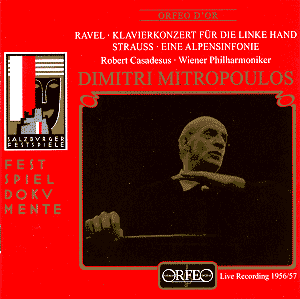Dimitri Mitropoulos was a quixotic figure, even at
an early age, unable to decide whether to take up music or to become
a monk. Later on in his career he was nicknamed "The Monk".
He was a strange character, always disposing of his not inconsiderable
income to colleagues in need. This was done to such an extent that at
the close of his life, he was almost destitute. His musical knowledge
was immense. He memorised scores, no matter how complex and conducted
from memory.
After his early life in his native Greece, he moved
to Minneapolis where he worked tirelessly with the orchestra, governors
and audiences to build up ensemble which was the toast of the USA. After
many years in the mid-west, with his reputation steadily growing, he
was appointed as Music Director of the New York Philharmonic Orchestra.
This orchestra had a fearsome reputation for devouring conductors, and
although the initial years were very fruitful, the politics and behind
the scenes back-biting eventually took its toll on his health and his
confidence, although not on his abilities.
His conducting style was also strange, involving the
batonless hands and a movement style quite unlike any other conductor.
When his career in New York was on the skids, he travelled to Europe
where he was almost deified, and it is said that, had he not died, he
would have been appointed as Music Director of the Vienna Philharmonic.
His musical style is very much evident in these recordings,
and emerges clearly despite the mono recording and balancing problems
in the Festspielhaus, Salzburg. He had a reputation for bringing out
the inner parts of a score, and yet allowing the orchestra considerable
licence in matters of phrasing etc. His recording career was fairly
small, since with his extrovert style, he could cause problems in the
recording studio. His contract with Columbia primarily involved using
him as accompanist rather than an orchestral conductor. However some
of his commercially available performances were stunning.
In the Ravel, Robert Casadesus is somewhat approximate
in his playing, and so the full effect of the performance is lost. However
this will give you an idea of how Mitropolous balanced his players.
Throughout, you will hear anew the inner detail of Ravel’s wonderful
score.
Mitropoulos was a keen amateur mountaineer, and at
times of stress, he would set off into the countryside wherever he was
resident and climb, often by himself. This was one of his favourite
pastimes, the other was to watch movies. His love of the wide open spaces
and the grandeur of the high peaks, present in abundance in Strauss’s
symphony, stirred in Mitropoulos and the Vienna orchestra a tremendous
drive and romantic sweep. I can honestly say that if you have not heard
this disc before, Strauss’s work will come as an absolute revelation
to you. It apparently affected both orchestra and audience in much the
same way. It is very much our loss that Mitropoulos’s career ended,
only a few years after this recording, in 1960.
Often live recordings taken from festival archives
are a way for a record company to make a quick profit from a famous
artist, and the results can be to the detriment of that artist. Here
however, we have a conductor who is relatively unknown (certainly today)
who performed best in a live environment. We are in Orfeo’s debt for
allowing us to eavesdrop on these wonderful performances.
John Phillips


